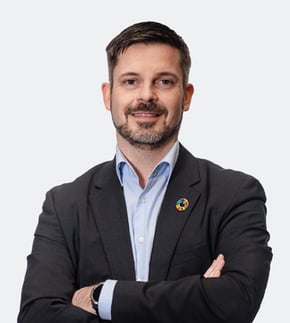At the beginning of last year, the district of Bernkastel-Wittlich initiated the process of developing a digital strategy with the support of bee smart city GmbH and Detecon International GmbH, and this process has now been completed. The strategy was approved in the district council meeting on December 11, 2023, and publicly presented at the district administration in Bernkastel-Wittlich on January 30, 2024.

Following a welcome by District Administrator Gregor Eibes, various expert presentations highlighted the significance and opportunities of digitalization for districts. Björn Gedicke from the German County Association introduced the Smarte.Land.Regionen model project, in which the district participates as one of seven nationwide, and through which the digital strategy was funded. Smarte.Land.Regionen is a funding initiative by the Federal Ministry of Food and Agriculture (BMEL) under the Federal Program for Rural Development and Regional Value Creation (BULEplus).
In her presentation, Franziska Stader from Prognos AG addressed the question, "Well organized? How are Germany's municipalities preparing for digital transformation?" Stader assists the district in achieving its digital objectives within the model project.

Following this, Deborah Mertes, the project manager of Smarte.Land.Regionen for the district administration, provided an overview of the digital strategy, which covers areas such as mobility, economy & work, education & digital skills development, society & community life, environment & climate protection, and health. The overarching goal of the strategy is to enhance the district's appeal to businesses and ensure its long-term viability for residents, thereby maintaining its attractiveness as a place to live and work.
Subsequently, participants had the opportunity to examine and prioritize the digital projects of the digital strategy on various display boards.
The Fraunhofer Institute for Experimental Software Engineering was also represented on-site by Martin Kohl. He introduced the booking platform LandRäume and the digital marketplace, both developed as part of the Smarte.Land.Regionen research project. Through the LandRäume website, available spaces in the district, such as community centres, can be booked. The digital marketplace aims to enhance public services in rural areas. Its unique feature is nationwide availability, along with the quick and easy search for and provision of quality-assured and demand-oriented digital solutions.
Following this, Ben Uhl, Managing Director of the Intercompany Training Center Association (ÜAZ), and Pia Debald, Head of Career Orientation and Preparation at ÜAZ, presented the Maker-Mobil project. This mobile learning workshop is designed to make the existing offerings of the Makerspace in Wittlich accessible to rural areas. The Maker-Mobil serves as a mobile creative space, providing equipment for various participatory formats and experimental learning, travelling to where it is needed. Whether it's 3D printing, laser cutting, or robot programming, the Maker-Mobil offers children, teenagers, and adults the chance to easily familiarize themselves with modern technology. This project is also funded through the Smarte.Land.Regionen initiative.
District Administrator Gregor Eibes concluded the event with heartfelt thanks to all participants, particularly acknowledging the significant support from bee smart city and their partner Detecon International in developing the digital strategy. He also emphasized the importance of viewing the closing event not as an endpoint but as the beginning of implementing the digital projects.
The creation of the digital strategy is an initiative of the Bernkastel-Wittlich district, carried out as part of district development. District development is a department within the Bernkastel-Wittlich district administration, where cross-sectional tasks are addressed, and projects are implemented to actively tackle current challenges such as demographic, economic, social, digital, and climate changes. The goal is to ensure the district's long-term viability and maintain its attractiveness as a place to live and work.
Photo Credits: Bernkastel-Wittlich District Administration
Learn more about our services for municipalities in the field of Smart City & Smart Region.
About bee smart city
bee smart city is a specialist digital software and consulting company with the mission to empower municipalities to successfully manage the transformation to smart and sustainable cities and regions. With the Smart City Toolbox – a unique Software-as-a-Service solution for cities and regions - we enable the effective management of smart city strategies and corresponding projects digitally and collaboratively in one place. With 14.000+ Members from 170 countries, bee smart city operates the largest free smart city online network and community for smart city professionals to share knowledge, learn and gain market insights. The platform is also available as a white-label solution for organizations that want to foster collaboration between different stakeholders. In addition, we offer a unique global smart city tender service to give solution providers access to newly issued smart city tenders worldwide. Last, but not least, we advise cities in crafting and implementing smart city strategies and solutions through our smart city consulting services.
Learn more at: www.beesmart.city


